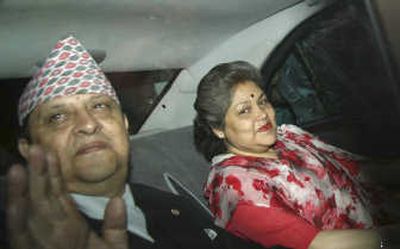World in brief: Nepal’s deposed king quits palace

Nepal’s deposed king gave up his crown of peacock feathers, yak hair and jewels on Wednesday and left his palace forever.
Former King Gyanendra’s departure closed the final chapter on the world’s last Hindu monarchy, but a remnant stayed behind: the 94-year-old mistress of the deposed monarch’s grandfather, who died more than a half-century ago.
Few Nepalis knew of the mysterious elderly woman’s existence until authorities announced Wednesday that she would be allowed to continue living in the palace. The reason: the youngest mistress of King Tribhuwan, who ruled the Himalayan kingdom from 1911 until his death in 1955, has no house to move to or relatives to take her in.
Little else will remain, however, of a dynasty that united Nepal and reigned for 239 years. The palace – a pink concrete monstrosity – will be turned into a museum. But there’s little likelihood it will celebrate a monarchy that Nepal’s new government of former communist rebels fought to overthrow.
Gyanendra is to live as something akin to an ordinary citizen, albeit an incredibly wealthy one, protected by police at a one-time summer palace on a forested hill on the outskirts of Katmandu.
Washington
Beef deal won’t be renegotiated
The Bush administration said Wednesday it will not renegotiate a deal that restored beef trade between the U.S. and South Korea, even as Seoul pushes for changes amid protests that threaten to bring down the pro-American government.
Representatives sent to Washington by South Korea’s president, Lee Myung-bak, sought assurances that the U.S. would not ship beef from cattle older than 30 months, even though the recently settled pact would allow it. Younger cattle are believed to be less susceptible to mad cow disease, or bovine spongiform encephalopathy.
But the No. 2 official at the Agriculture Department, Deputy Secretary Chuck Conner, said the U.S. has “national protocols that we have negotiated with the Korean government and we do not intend to renegotiate those protocols.”
The visits this week by Lee’s envoys come as South Koreans protest the planned resumption of U.S. beef imports. The dispute has paralyzed Lee’s government.